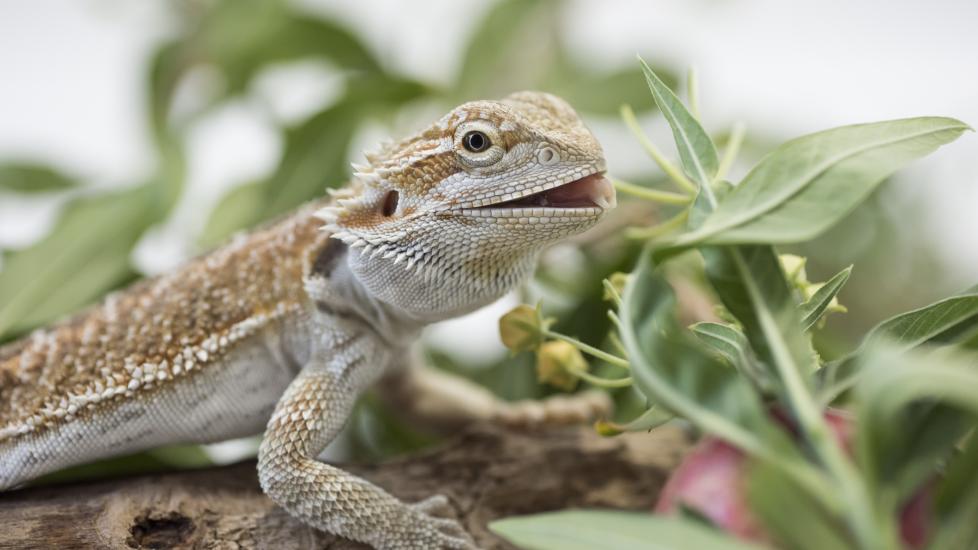What Do Bearded Dragons Eat?
JeannetteKatzir/iStock / Getty Images Plus via Getty Images
Bearded dragons are one of the most popular pet reptiles, and proper nutrition is key to keeping them healthy. So what do bearded dragons eat?
Bearded dragons are considered omnivores and can eat a variety of animal- and plant-based foods. Overall, bearded dragons are one of the easier reptiles to feed, as many manufactured diets are specifically designed for them and readily available.
Bearded Dragon Diet
Bearded dragons require live insects as the main component of their diet (about 70%), including:
All insects fed to bearded dragons should be gut loaded for six to 12 hours prior to feeding to ensure nutrients are delivered to your bearded dragon. Live insects must be gut loaded with a nutrient-dense insect supplement to improve their nutritional value. Gut loading diets are fortified with vitamins and minerals to help provide optimal nutrition to the reptiles that feed on them.
Bearded Dragon Food
Manufactured bearded dragon food can be offered as a supplemental food source. There’s a variety of commercial diets available catered to the age of your reptile, such as juvenile and adult bearded dragon feed.
Commercial food for bearded dragons should be fed in conjunction with fresh and live food to provide a diverse diet for your dragon friend.
Bearded Dragon Calcium and Vitamin Supplements
Calcium supplements should be used to dust live prey items to ensure your bearded dragon gets an adequate amount of calcium. Additionally, UV light needs to be provided for your bearded dragon to allow calcium to be absorbed.
Vitamin supplements should be provided as a powder with live prey one to two times weekly. This will help prevent any nutritional diseases.
What Vegetables Do Bearded Dragons Eat?
Salads can consist of a combination of the foods listed below. Vegetables should make up 20–30% of the total bearded dragon diet.
-
Romaine lettuce
-
Green leaf lettuce
-
Red leaf lettuce
-
Turnip greens
-
Mustard greens
-
Bok choy
-
Dandelion greens
-
Collard greens
-
Kale
-
Arugula
-
Squash
-
Zucchini
-
Sweet potato
-
Broccoli
-
Peas
-
Beans
-
Okra
-
Grated carrot
What Fruits Do Bearded Dragons Eat?
Fruit should make up no more than 5% of your bearded dragon’s diet, and may include:
-
Papaya
-
Melon
-
Strawberries
-
Blueberries
-
Banana
Best Food for Bearded Dragons
The best diet for a bearded dragon is balanced, diverse, based on their life stage, and complete with vitamin and calcium supplementation. This will ensure your bearded dragon will thrive at all life stages.
The best dry bearded dragon diet is Mazuri® bearded dragon diet for adults. This diet is created with adult bearded dragons in mind and formulated by nutritionists.
What Do Baby Bearded Dragons Eat?
Young bearded dragons eat insects for most of their diet. This changes as they mature and start to eat more vegetables and fruits. It’s important to gut load and dust your insect prey items prior to feeding young bearded dragons, to promote growth.
What Can Bearded Dragons Not Eat?
Bearded dragons should not be fed any diets designed for other animals or humans. This includes:
-
Dog food
-
Cat food
-
Raw meat
-
Rabbit food
-
Eggs
Bearded dragons should also not be exclusively fed a commercial pelleted diet. Beardies require more diversity in their diet, as well as hydration from their food. Feeding the incorrect diet to your bearded dragon can lead to nutritional imbalances.
How To Feed a Bearded Dragon
Hatchling bearded dragons are fed small meals two to three times daily and tend to eat primarily small-moving prey, such as one- to two-week-old crickets. Prey items should not exceed 1/2 to 2/3 the width of the dragon’s head. Salads should be offered at an early age. As they grow, bearded dragons will start to eat more salads and vegetables.
Juvenile bearded dragons should be offered food such as salads, vegetables and live prey items in combination daily. Adults can eat a diet of 70–80% salad greens, 20–30% vegetables, and 2–5% fruit every day.
When offering adult bearded dragons live prey items, gut loaded insects should be offered three to four times per week. Each bearded dragon is different; some might enjoy chasing live prey items around the enclosure, while others may benefit from being fed prey items with tweezers.
Always provide your bearded dragon access to drinking water. Based on the size of your bearded dragon, the water bowl should be a size that will allow them to soak. This will also help increase the humidity of the enclosure, which should be maintained between 40–60%.
Bearded Dragon Food FAQs
How often do you feed a bearded dragon?
Bearded dragon feeding frequency is based on the size and life stage of the animal. Adult bearded dragons should be fed salad and vegetables daily and fed live prey three to four times per week.
Can I feed my bearded dragon dry food?
Yes, commercially available dry foods are specifically formulated for bearded dragons. These dry food diets should make up a small component of your dragon’s diverse diet.
Can bearded dragons eat scrambled eggs?
No. Bearded dragons should not be offered animal-based proteins such as scrambled eggs. This type of diet item can lead to nutritional imbalances.
What is a bearded dragon’s favorite food?
Every bearded dragon will have a favorite food that they find rewarding. Some like strawberries, and some love to eat live prey items because they enjoy stalking.
What do bearded dragons eat in the wild?
In the wild, bearded dragons feed on vegetation, including fruit and leaves. Additionally, they consume invertebrates such as ants and beetles. Bearded dragons have also been known to consume small lizards if they are able to catch them.
